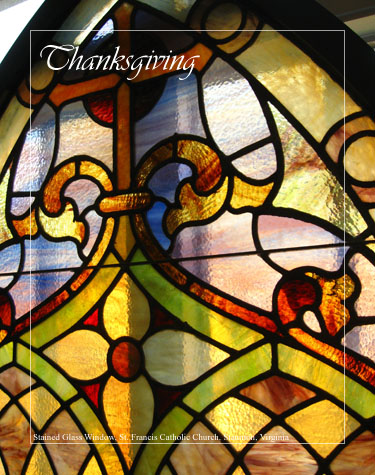
Volume XII, Issue XVI
Thanksgiving is Good for You
Enter his gates with thanksgiving and his courts with praise; give thanks to him and praise his name. For the LORD is good and his love endures forever; his faithfulness continues through all generations.” -- Psalm 100:4-5 NIV
The 'other' Weekly News Magazine [click to read] once featured the story: "Why ANXIETY is Good for You." We at THYME see this one a bit differently. In the Bible, Philippians 4:6 exhorts us NOT to be anxious. Rather we are to view our needs in light of our relationship to a loving G-d. Indeed, our requests are presented in light of the gratitude we feel as we consider the goodness and provision to be found in the Divine.
Not be anxious? In today's world? That is precisely the direction given the believer. We live in a stress-filled world and we are not commanded to shut ourselves away but rather to interact with it... becoming a conduit for G-d's Love to reach it. Indeed History shows us people of Faith fighting plagues, caring for the helpless and generally DOING things, often navigating the best course we can in unclear situations. We are NOT helpless, though we often seem to labor in insufficient light.
Fitting thoughts as we celebrate the feast of Thanksgiving. These are indeed anxious times, and it is easy to become overwhelmed by the general angst of the period we live in. History tells us of Divine promise and fulfillment. The Patriarchs piled up stones to remind them of G-d's faithfulness in the past and to keep them faithful as they waited to see His faithfulness in their present lives.
And it shall be on the day when ye shall pass over Jordan unto the land which the LORD thy God giveth thee, that thou shalt set thee up great stones, and plaister them with plaister: And thou shalt write upon them all the words of this law, when thou art passed over, that thou mayest go in unto the land which the LORD thy God giveth thee, a land that floweth with milk and honey; as the LORD God of thy fathers hath promised thee." -- Deuteronomy 27:2-3
Indeed, one must recount the stories of how G-d met needs in times past. One must also tell of the promises of G-d. Faith needs fuel, and Gratitude is the substance that makes our faith burn bright, even in the darkest of times.
Standing on the Promises [1.]
Standing on the promises of Christ my King,
through eternal ages let his praises ring;
glory in the highest, I will shout and sing,
standing on the promises of G-d.
Refrain:
Standing, standing,
standing on the promises of Christ my Savior;
standing, standing,
I'm standing on the promises of G-d.
Standing on the promises that cannot fail,
when the howling storms of doubt and fear assail,
by the living Word of G-d I shall prevail,
standing on the promises of G-d.
(Refrain)
3. Standing on the promises of Christ the Lord,
bound to him eternally by love's strong cord,
overcoming daily with the Spirit's sword,
standing on the promises of G-d.
(Refrain)
4. Standing on the promises I cannot fall,
listening every moment to the Spirit's call,
resting in my Savior as my all in all,
standing on the promises of G-d.
(Refrain)
The staff of THYME wish you a most blessed Thanksgiving!
The 'Common Course and Condition'
America's First Experiment with Socialism
When the Pilgrims first set up their economic system in Plymouth they opted for a system where all the results of their labor were held in common. All of the colonists then drew from the common store what they lived on. The Common Course and Condition, as this system was called, resulted in some bad feelings on the part of those who produced effectively and some lack of initiative on the part of those who were happy to have the food without the work.
The system produced constant shortages and a man who rose early and worked diligently came quite naturally to resent his neighbor who slept in and contributed less effort. Friction was high among the colonists and in 1623 Governor William Bradford declared the common course a failure.
The colonists were next assigned plots by families. Larger families were given larger plots. Everyone was responsible for the production of his own land and growing food for his own family. The results were notable. Far more crops were planted and tended. There was plenty instead of shortage and all in response to this new sense of ownership.
Church Found where
Pocahontas was Married
Her eyes meet yours as you enter the Virginia Executive Mansion. A young girl from days long ago, yet her presence in the foyer immediately captured my attention. There are two portraits of Pocahontas in the room, one in English clothing (below) and the more familiar rendering seen above.
Pocahontas's formal names were Matoaka (or Matoika) and Amonute. Pocahontas is a childhood name that perhaps referred to her playful nature. After her marriage to John Rolfe, she was known as Rebecca Rolfe.
Archeologists say that they have Discovered the Church [click to read] where Pocahontas married Jamestown planter John Rolfe.
Harvest Hymn Written
in 1844 by Henry Alford
“Come, Ye Thankful People, Come” is a harvest hymn written in 1844 by Henry Alford. It is often sung to the tune “St. George's Windsor” by George Job Elvey. So I created this in light of Thanksgiving to remind us of what we should really be thankful for. Two of my photos are overlayed with the text of the hymn added." -- Kristina Elaine Greer Photo Graphic by Kristina Elaine Greer
View Larger Image [click to view]
The First Thanksgiving... in VIRGINIA!
It wasn't a grand feast, but rather a time of giving thanks! on December 4, 1619, almost 2 years before the pilgrims held the feast with their Native American benefactors, Captain John Woodlief came ashore near the present site of the Berkeley Plantation. He had sailed from Bristol, England in the Good Ship Margaret with 35 men. They had survived a harrowing storm on November 29th and felt great gratitude for their deliverance. Here is Their Story [click to read].
Lessons from Squanto for Today
The Man Who Taught the Pilgrims Offers Wisdom
In this 1911 illustration, Tisquantum teaches the settlers how to plant maize.
Here is an interesting ebook: Squanto's Garden [click to read] from Off the Grid News. Most of us know some snippets of Squanto's story... how he taught the settlers how to successfully cultivate the soil of their new home, but Bill Heid actually shares some practical gardening tips and garden layouts that Squanto might have shared with the Pilgrims. He also fills out Tisquantum's story, giving us insight into a man who's unusual life uniquely equipped him to teach others.
The Sun burns through a morning mist on Thanksgiving Eve.
A Native American's Amazing Story
" ... a special instrument sent by God for their good beyond their expectations ..." -- William Bradford
Today millions of Americans will dine on turkey and celebrate Thanksgiving. Most people will realize that it has some connection to the Pilgrims in Massachussetts, but the story of G-d's provision and the reason for the celebration seem to have faded in our collective memories.
The Pilgrims came to the New World for their kids. They were a Christian group who sought to live for G-d rather than be seduced by the culture around them. They lived in Holland for a while but they saw their children falling away from the faith.
So they moved. They sought passage on a ship bound for Virginia. The ship went off course and they landed in Massachussetts instead. They had a rough time of it their first winter and almost half of them died. Still, when offered the chance to return to Europe, they declined. Then one of the indigenous people walked into camp and spoke to them in English!
The man's name was Samoset, and he introduced the Pilgrims to Squanto, who taught the Pilgrims many things to help them survive in the new world. Squanto spoke even better English than Samoset. His story is amazing.
Squanto had first met Europeans around 1605 when Captain John Smith made his famous voyage. He travelled to England with him but when he returned to America he was captured into slavery and returned to Europe. Spanish monks bought his freedom and sent him to England where he found passage back to America. Sadly, his village was now gone, the people wiped out by disease. He found people nearby to live with but one day heard that a new group of people were living where his old village had stood. What's more, they spoke that funny new language that he had learned.
Samoset made the introduction and the rest, you might say, is history. Thanks to Squanto the Pilgrims survived and began to do quite well in the new world. Their relations with the Native people were quite good and their Thanksgiving was for the amazing provision they found in Squanto, of whom it was said:
" ... He desired honor, which he loved as his life and preferred before his peace ..."

Factory stacks in Waynesboro, Virginia. Photo by Bob Kirchman.
Something to Think About
[click to read]
Hate Didn’t Elect Donald Trump; People Did
By Victoria Sanders
Over the summer, my little sister had a soccer tournament at Bloomsburg University, located in central Pennsylvania. The drive there was about three hours and many of the towns we drove through shocked me. The conditions of these towns were terrible. Houses were falling apart. Bars and restaurants were boarded up. Scrap metal was thrown across front lawns. White, plastic lawn chairs were out on the drooping front porches. There were no malls. No outlets. Most of these small towns did not have a Walmart, only a dollar store and a few run down thrift stores. In almost every town, there was an abandoned factory.
My father, who was driving the car, turned to me and pointed out a Trump sign stuck in a front yard, surrounded by weeds and dead grass. “This is Trump country, Tori,” He said. “These people are desperate, trapped for life in these small towns with no escape. These people are the ones voting for Trump.”
My father understood Trump’s key to success, even though it would leave the media and half of America baffled and terrified on November 9th. (read more)

Corridor H, U. S. 48 through the mountains of West Virginia, promises to bring commerce and jobs to the region. Photo by Bob Kirchman.

A billboard between the towns of Thomas and Davis in West Virginia asks: "Got Faith?" Photo by Bob Kirchman.
